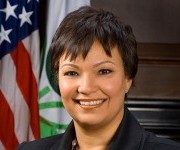Big oil, the Chamber of Commerce, the National Association of Manufacturers (NAM), and senators including Lisa Murkowski (R-Alaska) are whipping up hysterical fears that the Environmental Protection Agency will use its existing authority under the Clean Air Act to immediately restrict global warming pollution for even the smallest of emitters. For instance, NAM President John Engler makes the ridiculous claim that “If EPA moves forward and begins regulating stationary sources, it will open the door for them to regulate everything from industrial facilities to farms to even American homes.”
In fact, EPA’s efforts are simply following the law of the land established by the Supreme Court decision in Massachusetts v. EPA.
To calm the hysteria, EPA Administrator Lisa Jackson sent a letter to eight Democratic senators assuring them that EPA will pursue a very deliberative process for establishing limits on global warming pollution from the largest polluters first, which would leave ample time for Congress to establish a more comprehensive pollution reduction program before EPA standards take effect.
Administrator Jackson’s letter responded to a Feb. 19 letter from eight Democratic Senators that raised concerns about EPA’s plans to establish limits on global warming pollution from industrial sources. The eight senators represent coal mining, auto manufacturing, or oil and gas states. Five are from coal states: Jay Rockefeller (W.Va.), Sherrod Brown (Ohio), Bob Casey (Pa.), Max Baucus (Mont.), and Robert Byrd (W.Va.). Two come from auto manufacturing states: Claire McCaskill (Miss.), Carl Levin (Mich.). And one senator comes from an oil and gas state: Mark Begich (Ark.).
These senators urged that EPA provide time for Congress to adopt comprehensive global warming legislation before using the Clean Air Act authority to restrict pollution. They worry about the impact of EPA setting carbon pollution limits for the utility and other large polluting industries. They wrote Jackson:
We need a clear understanding of how you view your agency’s responsibilities and the process by which you intent to carry them out in order to represent the workers industries, taxpayers, and economic interests of our states …
The President and you have been explicit in calling on Congress to pass comprehensive legislation that would enhance our nation’s energy and climate security. We strongly believe this is ultimately Congress’ responsibility, and if done properly, will create jobs, spur new clean energy industries, and greatly advance the goal of U.S. energy independence.
These senators concerns are legitimate, but will not occur. Administrator Jackson’s letter makes it clear that there is ample time for Congress to pass bipartisan comprehensive clean energy and global warming legislation before pollution limits under the Clean Air Act would begin.
No facility will be required to address greenhouse gas emissions in Clean Air Act permitting of new construction or modifications before 2011.
For the first half of 2011, only facilities that already must apply for Clean Air Act permits as a result of their non-greenhouse gas emissions will need to address their greenhouse gas emissions in their permit applications.
EPA does not intend to subject smaller facilities to Clean Air Act permitting for greenhouse gas emissions any sooner than 2016.
Administrator Jackson also plans to increase the threshold for setting carbon pollution limits so that it focuses on the largest sources first.
EPA is also considering a modification to the rule announced in September requiring large facilities emitting more than 25,000 tons of greenhouse gases a year to obtain permits demonstrating they are using the best practices and technologies to minimize GHG emissions. EPA is considering raising that threshold substantially to reflect input provided during the public comment process.
Senator Begich was reassured by Administrator Jackson’s letter. He said that schedule described by in the letter “makes me feel a lot more comfortable.” Senator Rockefeller noted that “it helps,” though he still plans to introduce a bill to delay EPA for two to five years. This delay seems fairly unnecessary given the schedule in the EPA letter.
Administrator Jackson also makes it clear that passage of Sen. Murkowski’s “Dirty Air Act” to block EPA from protecting people from global warming pollution would undo the near final limits on greenhouse gas pollution from motor vehicles that the auto industry negotiated in 2009.
You asked in your letter what the result would be if Senator Murkowski’s resolution of disapproval of EPA’s endangerment finding were enacted. One result would be to prevent EPA from issuing its greenhouse gas standard for light-vehicles, because the endangerment finding is a legal prerequisite of that standard … It would undo an historic agreement among states, automakers, the federal government, and other stakeholders.
Senator Levin expressed serious concerns about passage of the Murkowski Dirty Air Act if it would undo the clean car agreement. He wrote a Michigan constituent that it
would undercut the Obama administration’s intention to pursue a single, national standard for vehicle greenhouse gas emissions. I support the administration’s plan to implement a single, national standard, rather than a patchwork of standards that vary from state to state.
These eight Democratic senators raised legitimate questions about the impact of EPA’s following the law and the science, as required by the Supreme Court. The endangerment finding will establish a careful, thorough process for establishing limits on carbon pollution from the largest industrial sources, such as coal fired power plants. It is now incumbent on these senators — and Senator Murkowski — to ignore big oil and special interest flame throwing, and instead join efforts led by Senators John Kerry (D-Mass.), Lindsay Graham (R-S.C.), and Joe Lieberman (I-Conn.) to craft bipartisan, comprehensive legislation.




